
Seven alumni share how Adelphi opened doors, helped them overcome personal obstacles and set them up for professional and personal success.
These seven alumni hail from a rich tapestry of places and backgrounds. They pursued a wide range of subjects and embarked on diverse career paths. What they have in common is resilience in overcoming physical, social, financial, and other challenges—and in finding themselves and their futures at Adelphi. They share their stories of where they came from, the welcoming community, the small classes, and the professor-mentors they found at Adelphi, the setbacks they experienced along the way, and how they’re carrying on the Adelphi tradition of transforming lives. They truly exemplify the impact of an Adelphi education.
Luke Cooper ‘98, JD: Tech Entrepreneur Goes From “Mud to Magic”
Adelphi provided the support and opportunities to help him overcome adversity.
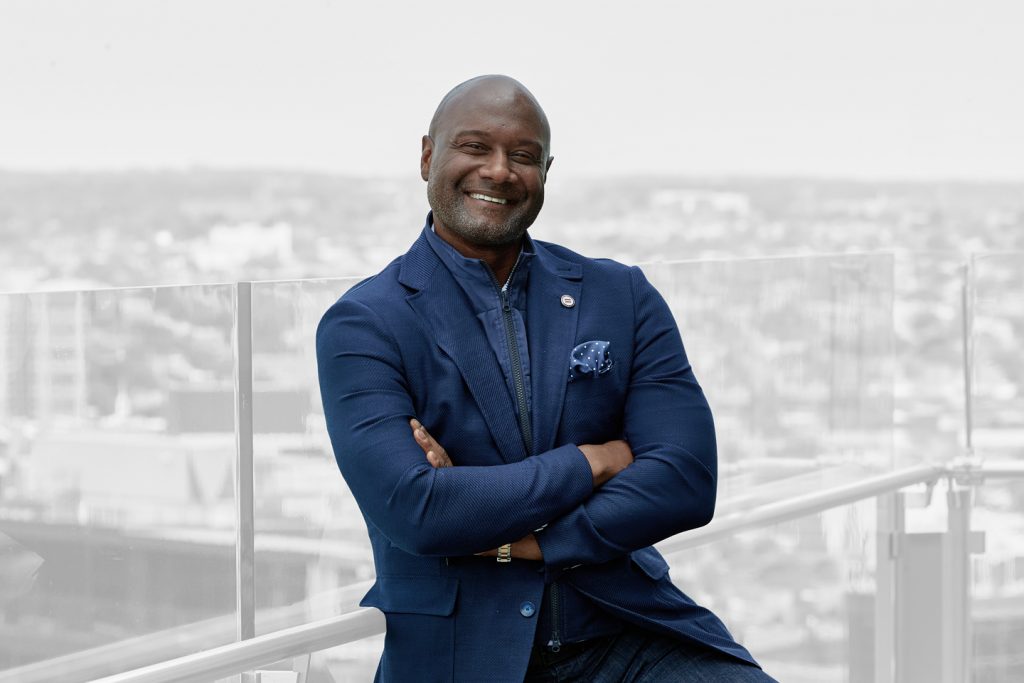
Luke Cooper ‘98, JD
Luke Cooper ‘98, JD, grew up in the housing projects of Bridgeport, Connecticut, at a time when major companies were leaving the city, taking away plenty of good jobs and leaving behind the sort of despair that led his father to abuse drugs and be sentenced to prison when Cooper was 12.
But a love of basketball and the opportunity to attend Adelphi on a basketball scholarship provided a lifeline that allowed Cooper to find his niche and become a successful tech entrepreneur. In 2006, Cooper co-founded Caldwell Technology Solutions, which was sold two years later for about $55 million. In 2008, he founded Fixt, a mobile device repair app, which he eventually sold for more than 11 times its revenue. He is now the founding managing partner of Latimer Ventures, a firm that invests millions of dollars in enterprise technology companies founded mostly by people of color who lack access to capital. “We’re recognizing the incredible talent, capability and resourcefulness of these entrepreneurs,” he said.
Set for Success
Compared to his upbringing, Adelphi’s Garden City campus, 66 miles from Bridgeport, “felt like a million miles away,” he said. “Adelphi was a welcoming place with tons of resources. It was my introduction to becoming an adult.”As a senior class vice president, four-year starter on the Panthers basketball team, and member of theHistory Honors Society and OmegaPsi Phi, Cooper became empowered at Adelphi.“It was liberating,” he said. “The dormitory was my first time having my own space. That’s not a thing you often have growing up in abject poverty. I remember having so much support at Adelphi and so many friends.”
Cooper found a parental figure in Gloria Grant Roberson ‘80, MS‘88, an associate professor of English and reference librarian at Adelphi and the author of a book on acclaimed writer Toni Morrison.“She was like a mom to me,” Cooper said. “She gave me a ton of encouragement and love and a general understanding that I was valuable. My mom was stretched super thin and my dad was in prison. But Professor Grant Roberson was very supportive.”
Attending Adelphi events also helped Cooper grow. At one event, he asked a question of former Russian President Mikhail Gorbachev.“I’m sure it was a question about war,” Cooper said. “It was incredible having that proximity to power. I felt that right to say the things I need to say in a room with no fear. Adelphi gave me that.”
Facing Adversity at Home
After he earned his degree in English, he attended graduate school with an eye toward a business career—and rescuing his dad.“I thought the best way to go into business was to become a lawyer,” said Cooper, who acquired his law degree at Syracuse University. “I had people around me at Adelphi who paid the first $200 for the LSAT prep course that helped me get into law school.”
Once he became a lawyer, he argued successfully for his dad’s release in 2001. But his father relapsed into addiction and passed away in 2013. In 2014, his daughter was struck with Stage 4 cancer and needed treatment; she is now cancer free.
Cooper said, “Those things made me stronger, wiser and helped me build deeper empathy that helps in how I support the entrepreneurs I work with. You have to be open to help them in whatever way they show up.
“No Mud, No Magic”
The phrase he uses to describe how he has conquered adversity and achieved success is “no mud, no magic.” He explained: “A lotus flower still grows beautifully despite emerging from mud. To become successful, you need to overcome adversity and be resilient.”
A lotus flower still grows beautifully despite emerging from mud. To become successful, you need to overcome adversity and be resilient.
Ewa Sobczynska ‘04: Planting Seeds for Global Change on a Grassroots Level
The international studies major has built on the values learned during her time at Adelphi.
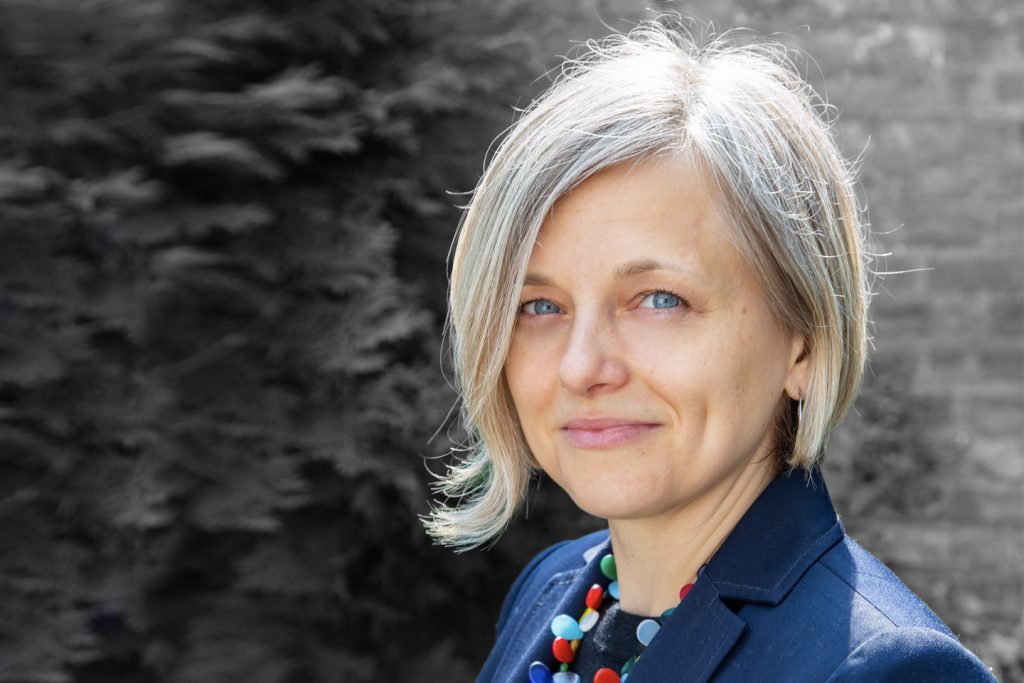
Ewa Sobczynska ‘04
For Ewa Sobczynska‘04, becoming an Adelphi student was “complete luck,” she said. When she was a university student in Poland studying applied linguistics, she came to the United States on tour with the choir. While visiting her aunt in New York City before heading back home, she met some Polish Americans, one of whom had graduated from Adelphi.
When Sobczynska said she’d like to come and live in New York for a year, he suggested that she go to Adelphi to talk to Richard Garner, PhD, who was then dean of the Honors College. “Dean Garner was so kind, so warm and so intellectually engaged,” Sobczynska said. “He helped me get a scholarship, which helped me conquer a financial barrier. He excelled at community— part of his mission was to create a community where people could bring their best selves.”
A Perfect Fit
With the support of her professors, Sobczynska overcame differences in the American education system and a slight language barrier. She wasn’t shy about speaking up in an academic environment that was a “perfect fit,” relishing both the Honors College community and the one she joined as an international studies major.
She was mentored by professor of political science and international relations Katie Laatikainen, PhD. To this day, she stays in contact with both Dr. Laatikainen and Dr. Garner, and has returned to campus on occasion to talk to current students. Although Sobczynska initially wanted to be a translator, Dr. Laatikainen’s Global Issues 101 class empowered her to engage in what was happening in the world— rather than be a support person— and ultimately led her to get her master’s degree in international relations at Georgetown University.
Making a Difference in People’s Lives
From there, Sobczynska began her ongoing career at the World Bank, as well as consulting work with international organizations, such as the China-based Asian Infrastructure Investment Bank.
Today, after serving for several years as chief of staff for the South Asia regional vice president, she is the region’s senior operations officer. As such, she is taking a “learning year” as part of a smaller team that’s focused on what environmental and social sustainability might mean in the South Asian context.
“We’re engaging with clients in the countries we work in and reaching the poorest and most disadvantaged,” she said, noting she always wanted to work at a grassroots level with those in need.
She views the World Bank as an amazing organization. “For me, the most memorable moments are seeing firsthand the projects that we finance with loans and the kind of impact they have.”
She reported that she was in Pakistan in December on a project. “We are working to bring the local government institutions to the people in an isolated and disadvantaged region of western Pakistan and to give the communities the opportunity for decision-making about small local grants and investment, for example, whether to build wells or roads. It will take three to four years before we see results on the ground—in the meantime, it is important to work closely with local government, community organizations and traditional leaders to set up the structures to make it happen.”
A Different Perspective
Sobczynska, who describes herself as a curious person, credits her career success in part to her level of intellectual engagement as an international studies student, as well as to growing up in Poland during a time of political transition, which gave her the motivation and perspective needed to oversee projects that change lives for the better.
For me, the most memorable moments are seeing firsthand the projects that we finance with loans and the kind of impact they have.
Malika Grayson ‘11, PhD: A STEMinist on a Mission
At Adelphi, the international student from Trinidad and Tobago got started on her path toward becoming a mechanical engineer, author and advocate for women of color in the sciences.

Malika Grayson ‘11, PhD
When Malika Grayson ‘11, PhD, was a high school student in her home country, Trinidad and Tobago, she hoped to find an undergraduate experience that would offer a gateway to engineering and also be close to some extended family who lived in New York City. Adelphi met those requirements, though it was a campus visit with her mother that cemented the deal.
“I came for a weekend, had a great time, met a lot of great people and I loved the campus,” Dr. Grayson said. ”It was a little culture shock for me, coming from an island and a close-knit family. I didn’t want to get to college and feel lost—and at Adelphi, I didn’t. It had excellent academic opportunities, of course, but also campus activities that kept us engaged at many different levels. There was a family feeling that I really appreciated.”
The physics major enjoyed exposure to ideas and fields beyond the sciences. She edited the Oracle yearbook, served on the Student Activities Board and was a residence hall monitor. She was a co-founder and president of Females of Culture United for Success, treasurer of Black Students United, a member of the Physics Club and a physics and math tutor. An art history assignment took her to the Museum of Modern Art for the first time— and sparked a longtime love of museums—and she also loved dance classes, particularly African dance.
Another attraction was Adelphi’s 3+2 program with Columbia University, in which a student can earn an Adelphi undergraduate degree and then study engineering at the Ivy League school. Working with her physics mentor, Sean Bentley, PhD, associate professor, however, moved Dr. Grayson toward thinking about completing a doctorate instead of just a master’s degree. “Through conversations with him, I realized that I did not have to follow the path that was laid out for me,” she said. “It was as simple as recognizing I did not have to stop at a degree in physics. If I wanted to learn more, why not pursue a PhD?”
Getting HOODED
She continued to a doctoral program at a different Ivy, Cornell University—becoming the second Black woman to earn a PhD in mechanical engineering there, and the first from the Caribbean. Her research focused on developing wind energy in urban areas. She has since worked at Northrop Grumman, a global aerospace, defense and security company, in a variety of roles: software developer, research and development manager, principal system engineer, application portfolio manager and, as of late 2023, system engineering manager.
She also served with multiple employee resource groups, including Victory Over Impairment & Challenge Enterprise, Northrop Grumman Women’s International Network STEM function and the African American Task Group. Along the way, in 2020, Dr. Grayson published a book, HOODED: A Black Girl’s Guide to the Ph.D., and is featured in another, Wall of Wonder: Cornell Women Leading the Way in Science, Technology, and Engineering. She also founded STEMinist Empowered, an organization focused on “bridging the representation gap” and supporting women of color who pursue graduate degrees through mentorship and personal statement reviews.
“I continue to ask, ‘What more can I do?,’” she said. “When I’m open to opportunities and flexible, that’s when I get the best results.”
It was a little culture shock for me, coming from an island and a close-knit family. I didn’t want to get to college and feel lost—and at Adelphi, I didn’t.
Eduardo Vilaro ‘85, ‘24 (Hon.): Dancing His Way to Success
The CEO and artistic director of Ballet Hispánico searched for community and found it in the arts—and at Adelphi.
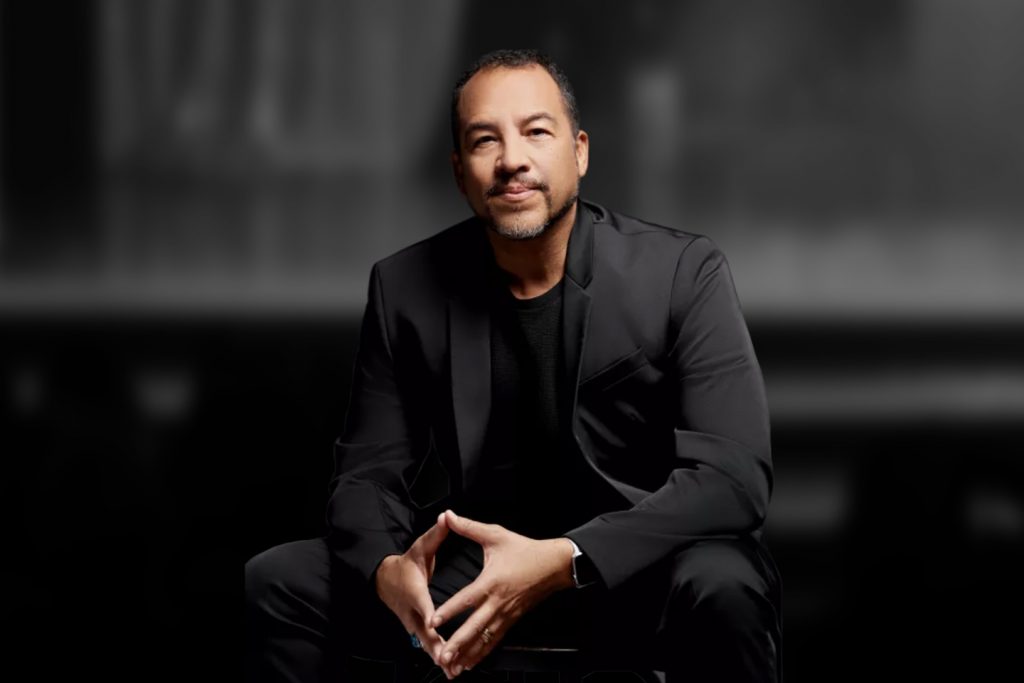
Ask any dance aficionado to name the top companies in the world and Ballet Hispánico would be on the list. It’s the largest Hispanic arts organization in the United States, with a repertory that celebrates its culture. Its dancers regularly take the stage at New York City Center and have performed at major cultural venues around the world.
But according to Eduardo Vilaro ‘85, ‘24 (Hon.), who succeeded founder Tina Ramirez as artistic director in 2009 and CEO in 2015, “We can’t just be in the fancy theaters. I learned from Tina that an arts organization that’s not based in its community is just a vanity project. We look for how we can connect to marginalized communities.”
Through its Community Arts Partnership programs, Vilaro has taken his dancers into jails and detention centers or to work with migrant children living in temporary housing. The company brings pride to Hispanic communities, but it also brings Latino culture to audiences of any and every ethnicity. “This is an organization about inclusion and I love when other people learn about my culture,” he said.
Finding a Home Onstage and in the Studio
Vilaro was born in Cuba in 1964, shortly after the Cuban revolution. When he was 6 years old, his parents immigrated to the United States, settling in the South Bronx. Vilaro had to adapt to being in a new country, learning a new language, dealing with the pressure to assimilate and how to come out to his family. He longed to find connection and belonging.
He found this when he was in a performance in the eighth grade. “The moment I stepped out in front of the audience, I felt love, I felt acceptance, I started feeling like I belonged. That’s what the art form gave me.”
Vilaro attended dance classes, which led to a scholarship to Adelphi’s dance program. “I loved every minute of it,” he said, citing teachers who had been professional dancers with renowned companies and how he’d learned other skills, like production direction and theater tech, “which is so important for my career. Every time I walked into a theater, I was fearless because of what I learned at Adelphi.”
Perhaps most importantly, “I was part of a community of dance students that was very diverse, and it was so beautiful because we found such comradery with one another.”
Paying It Forward
Nonetheless, he said there were dancers in the program with more experience. “I was in the back of the pack and catching up because I hadn’t had the resources to be in classes since I was 6 years old. And, in fact, that’s why [Ballet Hispánico offers] the Pa’lante Scholars initiative for dancers like myself, who have the talent but not the resources.” Ballet Hispánico also offers internships, and if an Adelphi dance student is interested, “I’d love to see them,” he said.
Every time I walked into a theater, I was fearless because of what I learned at Adelphi.”
Chris Armas ‘94: Soccer Success With a Team Approach
An Adelphi mentor taught this soccer standout the importance of diversity, respect and acceptance.
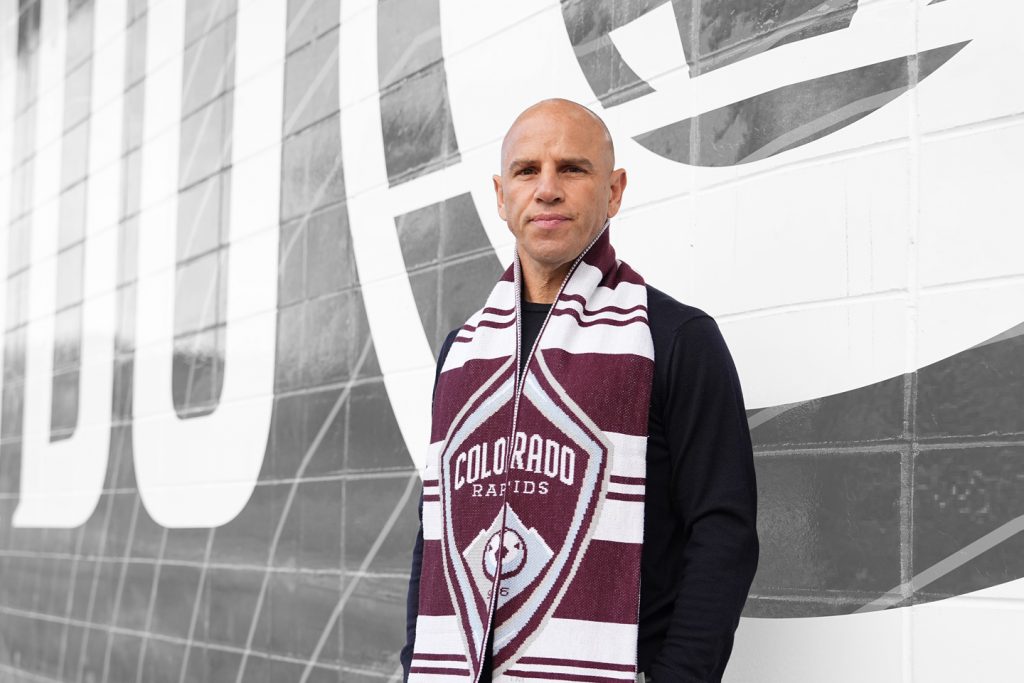
Chris Armas ‘94
During a career of success as a soccer player and coach, Chris Armas ‘94 has never forgotten that Adelphi University is where he learned he could achieve his dream.
Born in the Bronx, New York, and reared in working-class Brentwood on Long Island, Armas displayed soccer talent at an early age. He found a mentor in Bob Montgomery, his coach on a team of elite teenage players on Long Island. Montgomery’s full-time job was men’s soccer coach at Adelphi. That made Armas’s college choice easy.
“When I played for Coach Montgomery, I paid attention to how he ran practices and video sessions, how he communicated, how he treated every player with respect, and how he motivated us,” said Armas, now in his first season as coach of the Colorado Rapids in Major League Soccer.
Those life lessons helped the physical education major succeed as a four-year letter winner and All-American at Adelphi, a six-time MLS All-Star, the 2000 USA Soccer Athlete of the Year, and a midfielder who played 66 games for the U.S. National Team after playing in eight games for the Puerto Rico National Team. (His mother was born in Puerto Rico.) Before landing his current role, Armas coached Adelphi’s women’s team, the New York Red Bulls and Toronto Football Club in MLS, and Manchester United of England’s Premier League. “Success as a coach is about much more than strategy,” Armas said. “A bigger part is being able to manage people from different cultures and backgrounds, communicate effectively, get others to see the value in each person and bring them together as a team.”
Diversity Is a Strength
What Armas learned in classrooms at Adelphi was supplemented by the experience of playing on culturally diverse soccer teams.
“Our team was like the United Nations,” he said with a laugh. “We had players who were Hispanic, Puerto Rican, Cuban, Jamaican, British, Irish and Israeli. One of my teammates invited me to visit Israel during spring break. That was enriching. At Adelphi, it didn’t matter where you came from. All of us pulled for each other.”
In 2002, the Adelphi network helped lift Armas’s spirits after he sustained a major knee injury in an exhibition match and developed a staph infection weeks before he would have played for Team USA in the World Cup. Coach Montgomery was among those who visited him in the hospital. “No matter who you are, you’re going to experience setbacks,” Armas said. “It’s how you manage that adversity that determines whether you’re going to be successful. I worked hard to recover, and I learned not to get too high or too low, to keep things in perspective.” Armas recovered well enough to earn the MLS Comeback Player of the Year award in 2003.
Adelphi’s Family Feeling
Another influential figure for Armas at Adelphi was professor of sociology Salvatore Primeggia ‘64, MA ‘66, PhD. “I admired his passion for teaching; he was engaging,” Armas said. “You couldn’t come to class and hide. He would ask questions that made you want to contribute. The methodology he used to reach people was so interesting.”
Armas also met his wife, Justine Izzo Armas ‘98, at Adelphi. She worked as a nurse on the front line during the pandemic. Their two sons, Christopher and Aleksei, play soccer at Adelphi.
He describes Adelphi as a “campus where people know your name and you have a voice, where the classes are smaller and you get to know your professors and learn one-on-one. You can get involved in social activities and clubs on campus. If you want to play sports, the coaches care about you and want you to succeed. There’s a family feeling at Adelphi. That’s the beauty of the school.”
No matter who you are, you’re going to experience setbacks. It’s how you manage that adversity that determines whether you’re going to be successful..
Charleen Jacobs-McFarlane ‘06, PhD ‘23: The Power of Nursing
This nurse researcher is dedicated to studying a disease that affects the Black community.
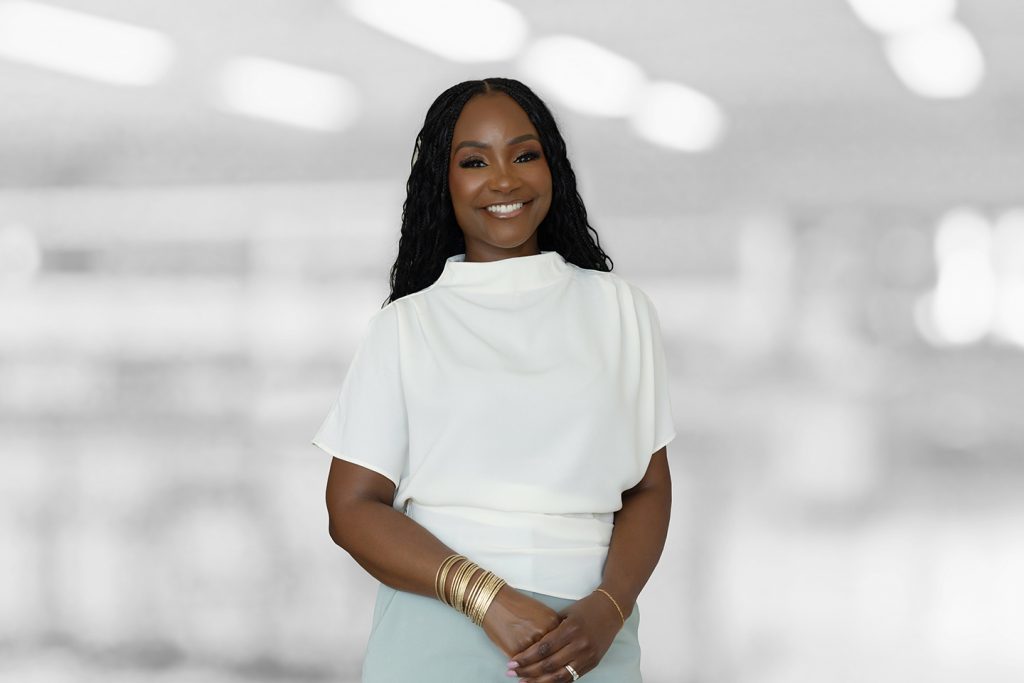
Charleen Jacobs-McFarlane ‘06, PhD ‘23
Nursing is in Charleen Jacobs-McFarlane ‘06, PhD ‘23’s DNA. “My parents were from the Caribbean, and both were nurses,” she said. “My mom wanted both my sister and me to get BSN degrees as a starting point for careers with many different directions.”
She said that Adelphi’s nursing program was well known and well respected: “When I think about it, it really did set me up for success.”
She has since become a successful specialist in sickle cell disease, an inherited red blood cell disease that affects as many as 100,000 African Americans and for which, until recently, no new drug therapies had been developed since 1905.
A magna cum laude BSN graduate, Dr. Jacobs-McFarlane credited Adelphi’s emphasis on the power of nursing with her early success. As she sees it, Adelphi-trained nurses are expected to be leaders, whether working at a patient’s bedside, being a nursing manager or executive, or as a clinical practitioner.
“You can become an expert in many different things. I’m able to use my knowledge, skill and education to help people improve their lives and ensure that they are living fulfilling lives. It’s what sets us apart,” she said. “It’s what matters to me the most as a nurse.”
A Focus on Sickle Cell Disease
As a master’s degree student at Hunter College, a Mount Sinai internship piqued Dr. JacobsMcFarlane’s interest in sickle cell disease—and eventually led to a job as a sickle cell practitioner in the hospital’s hematology department. Following that, her mentor in a Montefiore Hospital pain management program encouraged her to pursue her PhD.
She chose to return to Adelphi. “I knew it had a very good, established and flexible PhD program,” she reported. “All the classes were on Fridays, so I could work 10-hour shifts and have Fridays off. It was great.”
Most important, she recalled, “I felt welcomed and included and like I was back at home. She said Professor Patricia Donohue-Porter, MS ‘78, PhD ‘87, “was the best ever. She’s the PhD program director, and her caring, nurturing ethos just trickles down to everyone and disperses to the rest of the faculty. I was one of the lucky ones to get her as my dissertation chair.”
Last year was a banner year for Dr. Jacobs-McFarlane, who got married and earned her PhD. She is currently a postdoctoral research fellow at the Icahn School of Medicine at Mount Sinai Hospital. In this role, she is assessing whether sickle cell disease patients experience inequities in accessing care.
She continued, “We have quality indicators—such as education levels, where patients live and work, what insurance they may have and transportation to medical appointments—that affect their health that we can use to see if patients are getting appropriate care.”
Expanding Her Options
At the same time, she continues working as a nurse practitioner in Mount Sinai’s Comprehensive Sickle Cell Program, where she provides nursing care for 400 to 450 sickle cell patients. And as an assistant professor of nursing at Lehman College in her native Bronx, New York, she relishes the diversity of both fellow faculty and students.
She is looking forward to learning what her new degree might lead to. “I’m just starting over again, you can say, and starting something that I’m not used to doing in my everyday work. With my PhD, I can use research to effect change in the lives of those with sickle cell disease.”
You can become an expert in many different things. I’m able to use my knowledge, skill and education to help people improve their lives and ensure that they are living fulfilling lives. It’s what sets us apart. It’s what matters to me the most as a nurse.
Blakely Murphy ‘19: A Beautiful Mind
After undergoing brain tumor surgeries, this future psychologist was drawn to helping others overcome obstacles and learn resilience.
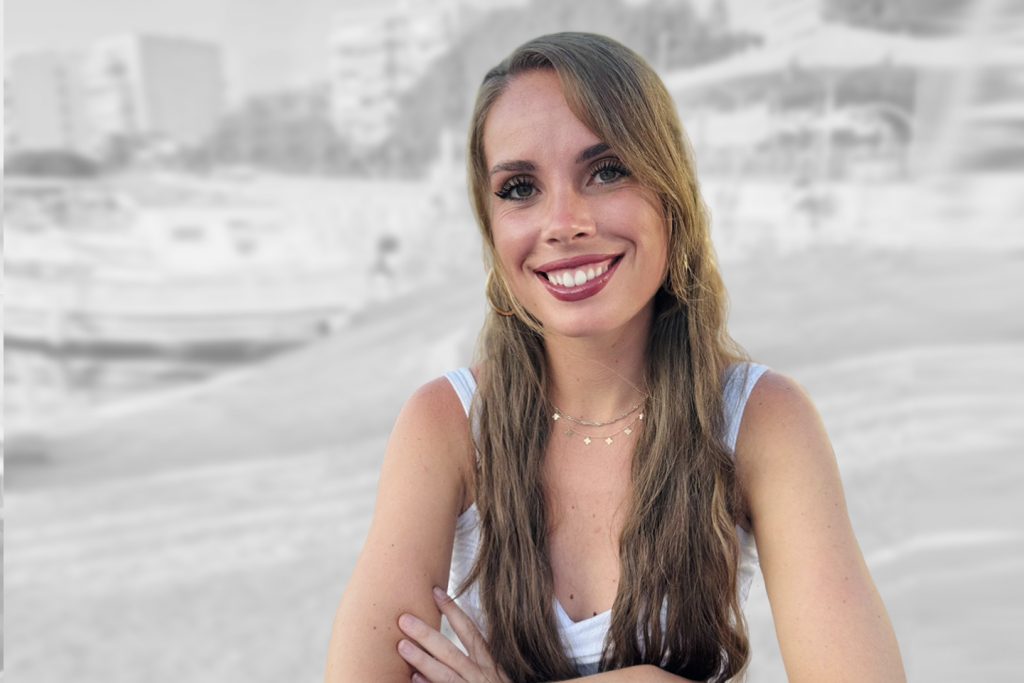
Blakely Murphy ‘19
When Blakely Murphy ‘19 receives her PhD in psychology, she’ll bring a unique perspective and understanding of the complexities of the human brain, but also of what can go awry—because she experienced it herself.
At the age of 11, the top student from Smithtown, New York, was playing in a basketball game. She suddenly felt ill and abruptly went to the sidelines. By the time her mother made it from the stands and to her side, the sixth grader was twitching and exhibiting other signs of what her mother immediately recognized as a brain seizure. Shortly before Blakely was born, her father had experienced similar symptoms and been diagnosed with an inoperable glioblastoma, the most aggressive form of brain cancer, and died at the age of 31.
Murphy’s seizure on the basketball court passed quickly and she insisted on returning to the game, but troubling symptoms continued and she was diagnosed with a brain tumor.
Fortunately, it was noncancerous and determined to be unrelated to her father’s glioblastoma. Still, it needed to be removed. Murphy became the youngest person to undergo invasive brain surgery, and she was kept awake during the procedure to help doctors minimize damage to functional brain tissue. She returned to school just six days later, but for the next two years she was tired and forgetful and her grades dropped. With hard work and the support of her family and teachers, she learned to fight through it and once again excel.
The tumor returned when she was 15, but this time she was treated using a new, highly innovative technique called Brainpath, which is minimally invasive, with far less risk of damaging healthy tissue and a shorter recovery time for patients.
Becoming Resilient
The experience led Murphy to “question what promotes resilience and how to help individuals build on their strengths to overcome obstacles.” She decided to pursue psychology and chose Adelphi because of its “excellent reputation” in the field.
Scholarships covered most of her tuition and fees, relieving the financial burden on both her and her mother. “I want donors to know that their support can give students opportunities they might not otherwise have. It really can alter the trajectory of someone’s life; it did mine.”
Her tumor returned in her sophomore year of college. Murphy said her Adelphi professors “were very flexible and accommodating” to ensure that she could stay on track despite being out for a week for surgery. “All of my psychology professors were so encouraging. I asked a million questions, went to office hours, got a lot of support. I can’t say enough good things.”
She is also grateful for the Emerging Scholars Program, which enabled her to do research with professor and chair of psychology Katherine Fiori, PhD, who is also associate dean for foundational psychology and faculty involvement, and led to the publication of three papers. “That’s where I realized I could see myself doing that kind of work,” Murphy said.
No Stopping Her
Murphy is now a doctoral student at George Washington University. She hopes to provide therapy and psychological assessment to college students and collaborate with faculty on critical research.
Her tumor returned two years into her doctoral program. Yet she remains undeterred. If anything, the experience gives her a deeper appreciation for what she has, to “be present in the moment, take advantage of opportunities and live life to the fullest,” she said. “Several times I didn’t know if I’d wake up from surgery, so I don’t worry much about the things I can’t control. How lucky I am to be here.”
I want donors to know that their support can give students opportunities they might not otherwise have. It really can alter the trajectory of someone’s life; it did mine.
This story was featured in the 2024 Issue of the Adelphi University Magazine.